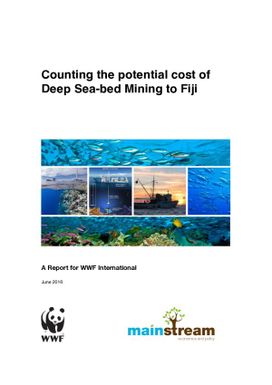Counting the potential cost of deep sea-bed mining to Fiji
- Description:
- Fiji has been identified as one of the countries most vulnerable to declines in reef condition due to the high dependence on reef systems for key industries (tourism and fishing). Much of the waters of Fiji and adjacent international waters include highly prospective deposits of copper, gold, zinc, silver and chemical elements. Extracting these resources is only now becoming feasible due to technological advances in Deep Seabed Mining (DSM). A large area of Fijis waters is now subject to DSM exploration licenses. But very little is known of the risks DSM creates for key marine ecosystem services and the industries that reply on those services for both income and employment (e.g. tourism and fishing). This desktop study seeks to identify, scope and broadly estimate the potential costs to Fiji associated with DSM. Only once those costs are understood, can Fiji confidently make robust policy decision about the amount, location and management of DSM within its waters.
- Display date:
- 2016
- Collections:
- Secretariat of the Pacific Regional Environment Programme (SPREP)
- Publisher:
- World Wide Fund for Nature (WWF)
- Content partner:
- Secretariat of the Pacific Regional Environment Programme (SPREP)
- Availability:
- Not specified
-
Copyright status: All rights reservedFind out more about what you are able to do with this itemThis item is all rights reserved, with means you'll have to get permission from Secretariat of the Pacific Regional Environment Programme (SPREP) before using it. For more information, please see our use and reuse page.What can I do with this item?Non-infringing useNZ copyright law does not prevent every use of a copyright work, and this item may be hosted by an international institute or organisation. You should consider what you can and cannot do with a copyright work.No sharingYou may not copy and/or share this item with others without further permission. This includes posting it on your blog, using it in a presentation, or any other public use.No modifyingYou are not allowed to adapt or remix this item into any other works.No commercial useYou may not use this item commercially.
Related items
Welcome and warm Pasifik greetings
The information on this site has been gathered from our content partners.
The names, terms, and labels that we present on the site may contain images or voices of deceased persons and may also reflect the bias, norms, and perspective of the period of time in which they were created. We accept that these may not be appropriate today.
If you have any concerns or questions about an item, please contact us.
